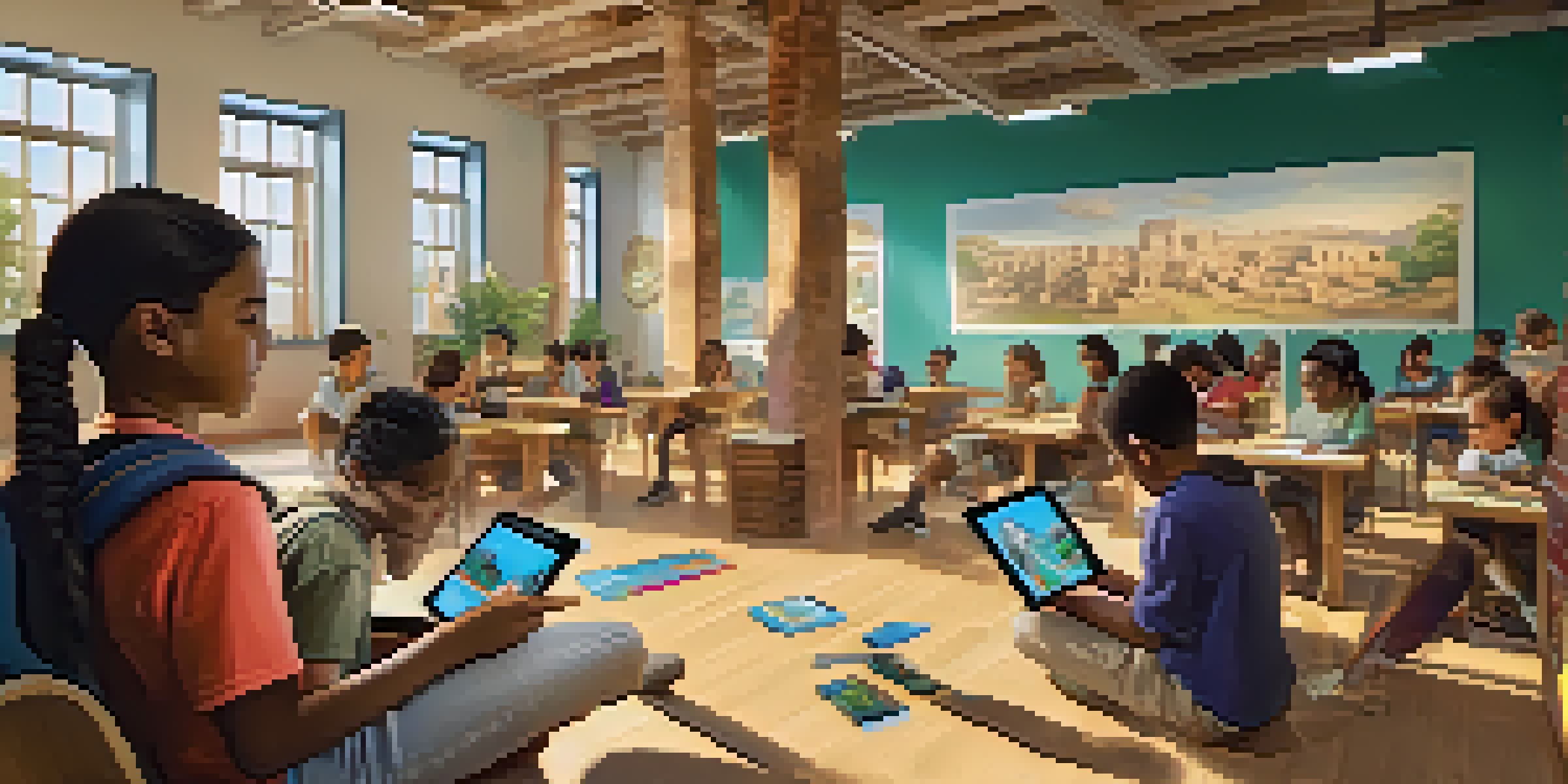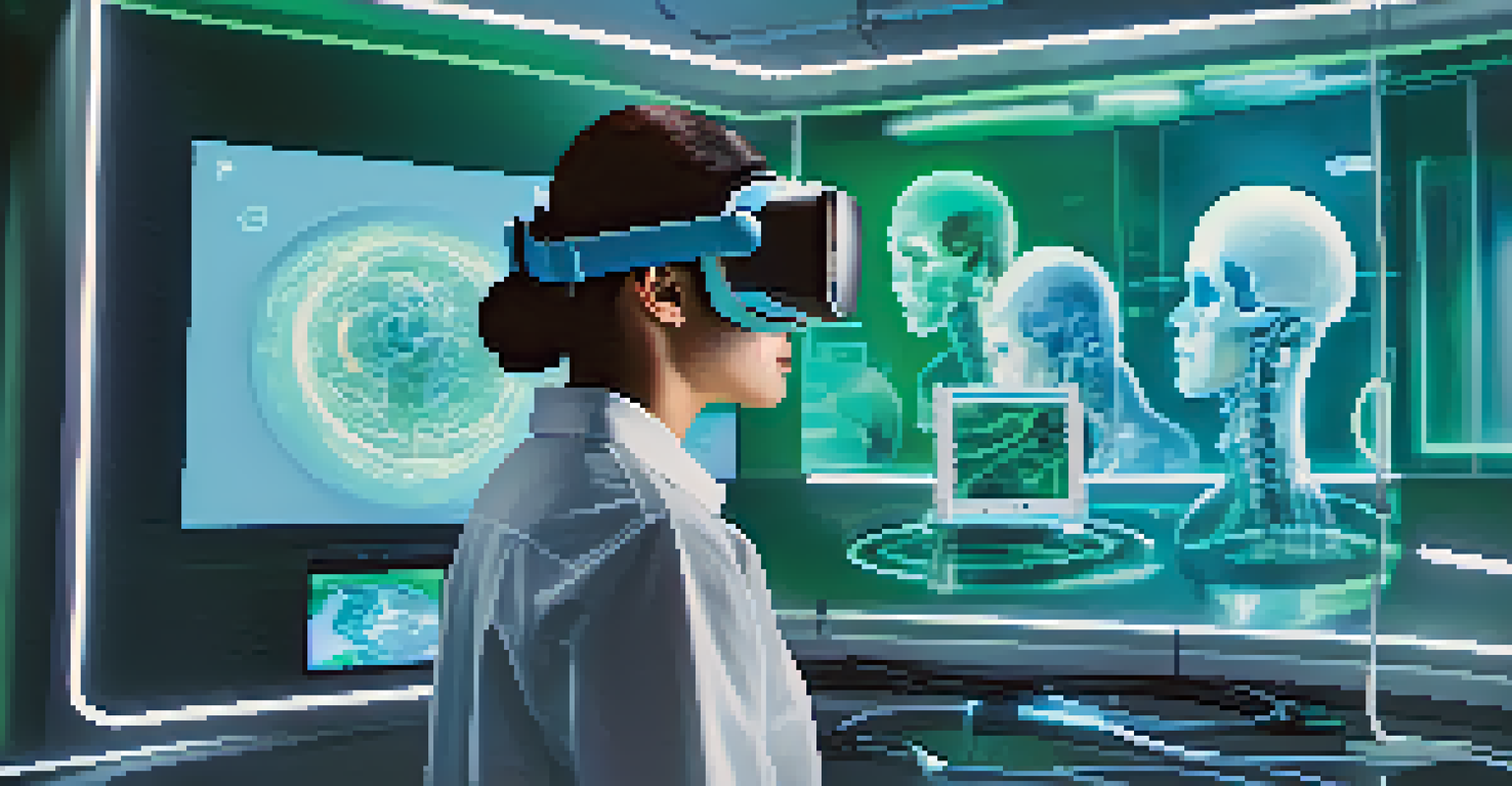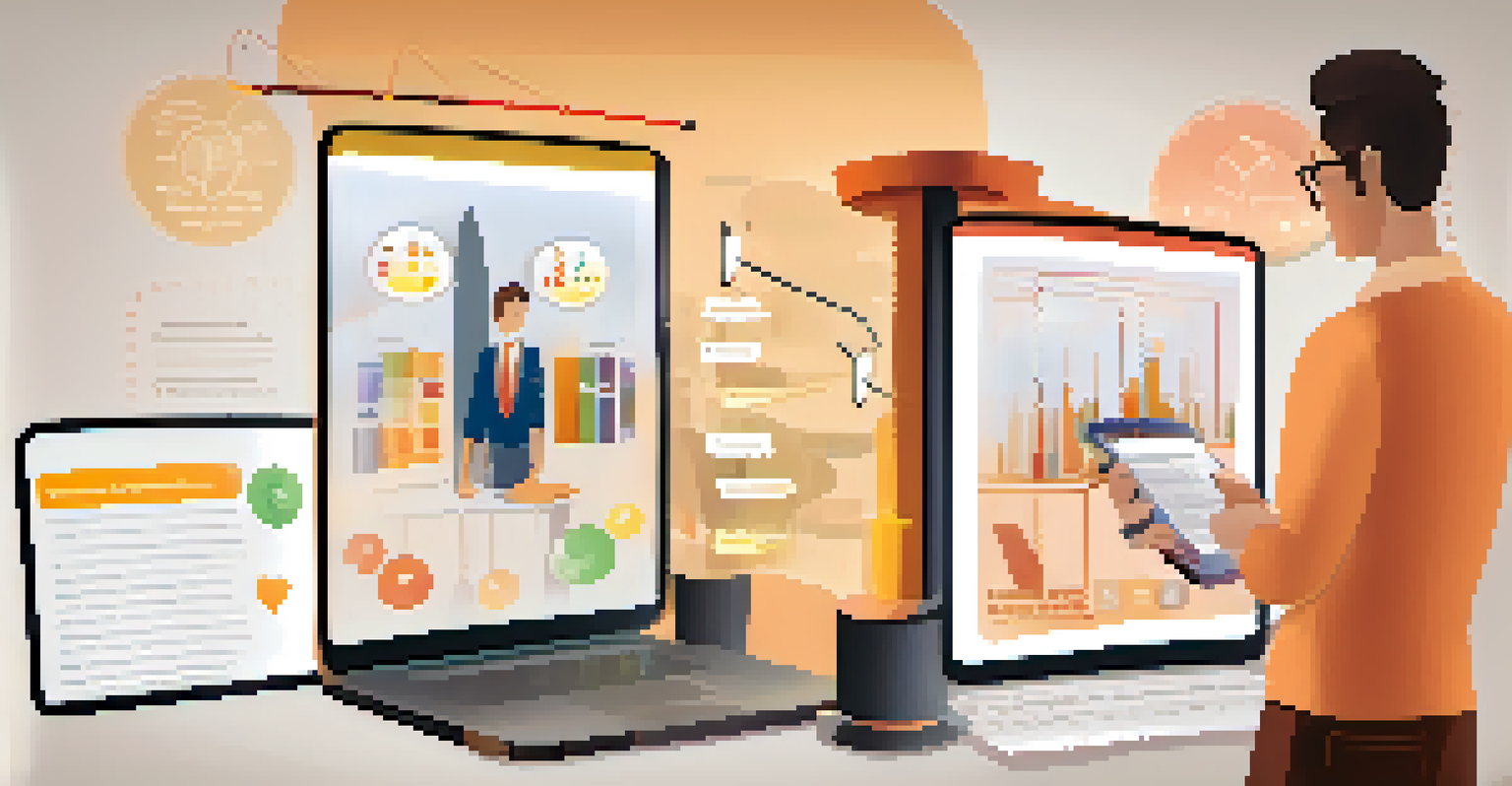The Future of Mobile Learning: Predictions for the Next Decade

The Rise of Personalized Learning Experiences
In the next decade, personalized learning will become a hallmark of mobile education. Imagine an app that tailors lessons based on your interests and learning pace, much like how music streaming services recommend songs. This approach not only keeps learners engaged but also allows them to absorb information more effectively. With advances in artificial intelligence, we can expect these personalized experiences to become even more sophisticated and intuitive.
Personalized learning is not a trend, it's a necessity for the future of education.
Moreover, mobile devices will leverage data analytics to track progress and adapt content accordingly. This means that if you struggle with a particular topic, the app will provide additional resources or alter the learning path. Such adaptability ensures that every learner gets the support they need, fostering a more inclusive educational environment.
As we embrace this shift, educators will play a crucial role in guiding and facilitating these individualized learning journeys. By combining their expertise with technology, they can create a rich learning experience that empowers students and enhances their educational outcomes.
The Integration of Augmented Reality and Virtual Reality
Augmented Reality (AR) and Virtual Reality (VR) are set to revolutionize mobile learning. Picture this: instead of just reading about historical events, students could visit a virtual reconstruction of ancient Rome right from their phones. This immersive experience makes learning not just informative but also thrilling and memorable.

These technologies will bridge the gap between theoretical knowledge and practical application. For instance, medical students could practice surgical procedures in a risk-free, simulated environment, enhancing their skills before real-world application. This hands-on approach can significantly improve retention and understanding of complex subjects.
Personalized Learning Takes Center Stage
The future of mobile education will focus on personalized learning experiences, utilizing apps that adapt to individual interests and learning paces.
As AR and VR become more accessible and affordable, we can expect to see a surge in their use in classrooms and remote learning environments alike. They will transform the way we engage with content, making education a more dynamic and interactive experience.
The Evolution of Microlearning Techniques
Microlearning is gaining traction as a preferred method for mobile learners, and this trend will only grow in the coming years. This approach involves breaking down information into bite-sized lessons, making it easier to digest and retain. It’s akin to snacking on knowledge rather than having to consume a full course meal at once.
Technology will never replace great teachers, but technology in the hands of great teachers is transformational.
As our attention spans dwindle in the digital age, microlearning caters to the need for quick, focused bursts of information. Mobile apps will increasingly offer short videos, quizzes, and interactive content that learners can engage with anytime, anywhere. This flexibility is key for busy individuals balancing work, life, and education.
The effectiveness of microlearning is already being recognized in corporate training and professional development, where employees can fit learning into their schedules without overwhelming themselves. As this model continues to evolve, we’ll likely see more educational institutions adopting similar strategies.
The Role of Artificial Intelligence in Mobile Learning
Artificial Intelligence (AI) is poised to enhance mobile learning significantly, making education more adaptive and efficient. Imagine a virtual tutor that not only assesses your knowledge but also provides real-time feedback and support, just like a personal trainer for your brain. This capability will make learning more responsive to individual needs and preferences.
AI can analyze a learner's strengths and weaknesses to suggest tailored resources and study plans. This level of customization ensures that each student receives the attention they require, paving the way for improved educational outcomes. Moreover, AI-driven chatbots will be available 24/7, answering questions and offering guidance outside traditional classroom hours.
AR and VR Transform Learning
Augmented and virtual reality technologies will create immersive learning environments, allowing students to explore and apply knowledge in engaging ways.
As AI technology matures, its integration into mobile learning platforms will become seamless, creating a more engaging and effective learning environment. This transformation will not only empower learners but also alleviate some of the burdens on educators and institutions.
The Growing Importance of Collaborative Learning
Collaboration will be a cornerstone of mobile learning in the future, encouraging peer-to-peer interaction and teamwork. Picture students from different parts of the world working together on projects via their mobile devices, sharing insights and perspectives that enrich their learning experience. This global network will foster a sense of community and belonging among learners.
Mobile platforms will increasingly incorporate features that facilitate collaboration, such as discussion boards, group projects, and real-time feedback tools. These features will not only enhance learning but also prepare students for the collaborative nature of the modern workplace. Learning will evolve from a solitary task to a shared journey.
As we look ahead, the emphasis on collaborative learning will also promote diversity and inclusion, allowing students from various backgrounds to contribute and learn from each other. This collective approach will significantly enrich the educational landscape.
The Impact of 5G Technology on Mobile Learning
The rollout of 5G technology will be a game changer for mobile learning, providing lightning-fast internet speeds and improved connectivity. This advancement means that learners will be able to stream high-quality videos, participate in virtual classrooms, and access vast libraries of resources without frustrating lag times. The enhanced experience will make mobile learning more engaging and effective.
Moreover, 5G will enable more sophisticated applications of AR and VR, creating richer immersive environments for learners. With seamless connectivity, learners can explore virtual worlds and collaborate in real-time, regardless of their physical location. This capability will make learning more interactive and enjoyable.
Digital Equity is Crucial
Addressing digital equity is essential to ensure all learners have access to the benefits of mobile education, regardless of their circumstances.
As we embrace the potential of 5G, educational institutions will need to adapt their strategies to harness this technology fully. By investing in infrastructure and innovative tools, they can create a future where mobile learning is not just a convenience but a transformative experience.
The Future of Assessment in Mobile Learning
Assessment methods will evolve significantly in the future of mobile learning, moving away from traditional exams to more dynamic evaluation techniques. Imagine being assessed through interactive quizzes, peer reviews, and project-based assignments that reflect real-world applications. This shift will foster a deeper understanding of the material and better prepare learners for their careers.
Mobile platforms will utilize analytics to provide instant feedback on performance, allowing learners to track their progress in real-time. This immediate insight helps students identify areas for improvement and adjust their learning strategies accordingly. Gone are the days of waiting weeks for results; assessment will be an ongoing and integrated part of the learning process.

As we reimagine assessment, it’s essential to ensure that these new methods are equitable and accessible to all learners. By embracing a more holistic approach, we can create a fairer educational landscape that values diverse skills and knowledge.
The Challenge of Digital Equity in Mobile Learning
As mobile learning continues to expand, the issue of digital equity will become increasingly important. Not everyone has equal access to smartphones, internet connectivity, or the latest technology, which can create a significant barrier to learning. It's crucial that we address these disparities to ensure that all learners can benefit from the advancements in mobile education.
Educational institutions and policymakers must collaborate to develop strategies that promote digital inclusion. This could involve providing subsidized devices, increasing broadband access in underserved areas, and creating community resources for learners. By working together, we can bridge the gap and empower all students to succeed.
As we look to the future, ensuring that mobile learning is accessible to everyone will be vital for fostering a more equitable society. By prioritizing digital equity, we can ensure that the benefits of mobile learning are enjoyed by all, regardless of their background or circumstances.